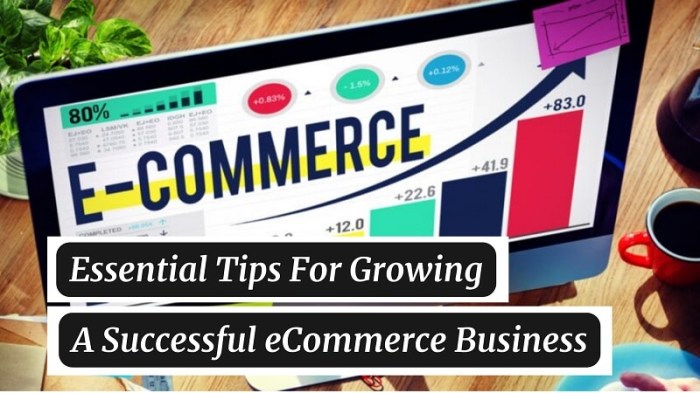E-commerce Growth Tips: Looking to boost your online business? Dive into our guide for expert strategies and insights that can take your e-commerce venture to new heights.
From defining e-commerce growth to enhancing user experience, we’ve got you covered with everything you need to know to thrive in the digital market.
Understanding E-commerce Growth: E-commerce Growth Tips
E-commerce growth refers to the expansion and development of online businesses in terms of sales, revenue, market presence, and customer base. In the digital age, e-commerce growth plays a crucial role in the success and sustainability of businesses operating online.
Successful E-commerce Growth Stories
- Amazon: Started as an online bookstore, Amazon has grown to become the largest e-commerce platform in the world, offering a wide range of products and services.
- Shopify: Shopify began as a platform to help businesses set up online stores and has experienced significant growth by enabling entrepreneurs to sell products online easily.
Importance of E-commerce Growth
- E-commerce growth is essential for businesses to stay competitive in the digital marketplace and reach a wider audience.
- It allows companies to expand their customer base beyond geographical boundaries and increase brand visibility globally.
- Increased e-commerce growth leads to higher revenue generation and profitability for businesses, driving overall success and sustainability.
Impact of E-commerce Growth on Revenue and Market Presence
-
E-commerce growth directly impacts revenue by increasing sales through online channels, reaching a larger customer base, and driving repeat purchases.
-
With the growth of e-commerce, businesses can enhance their market presence by establishing a strong online brand identity, engaging with customers through digital platforms, and leveraging data analytics for targeted marketing strategies.
Strategies for E-commerce Growth
In the highly competitive world of e-commerce, it is crucial to have effective strategies in place to drive growth and stay ahead of the game. From leveraging digital marketing to utilizing social media platforms, there are various key strategies that can help businesses expand their online presence and increase sales.
The Role of Digital Marketing in Boosting E-commerce Growth
Digital marketing plays a vital role in boosting e-commerce growth by increasing brand visibility, driving website traffic, and converting leads into customers. Some key digital marketing strategies include search engine marketing (SEM), email marketing, and influencer partnerships. By utilizing these strategies effectively, e-commerce businesses can reach a wider audience and improve their online sales.
Tips on Leveraging Social Media for E-commerce Expansion, E-commerce Growth Tips
Social media platforms offer a powerful way to connect with customers, promote products, and drive sales. To leverage social media for e-commerce expansion, businesses should focus on creating engaging content, running targeted ads, and interacting with followers. By building a strong social media presence, e-commerce businesses can attract new customers and retain existing ones.
The Significance of and Content Marketing in E-commerce Growth
Search engine optimization () and content marketing are essential components of e-commerce growth. helps businesses improve their website’s visibility in search engine results, while content marketing helps attract and engage customers through valuable and relevant content. By optimizing their website for search engines and creating high-quality content, e-commerce businesses can enhance their online presence and drive organic traffic to their site.
Enhancing User Experience

User experience plays a crucial role in the growth of e-commerce businesses. A positive user experience can lead to increased customer satisfaction, higher conversion rates, and repeat purchases. On the other hand, a poor user experience can result in high bounce rates and lost sales. Therefore, optimizing user experience should be a top priority for any e-commerce website.
Optimizing Website Design
Optimizing website design is essential for improving user experience. Here are some tips to enhance your website design:
- Ensure easy navigation: Make it simple for users to find what they are looking for by organizing your website layout logically.
- Mobile-friendly design: With the increasing use of mobile devices, it’s crucial to have a responsive design that adapts to different screen sizes.
- Fast loading speed: Users expect websites to load quickly, so optimize your website speed to reduce bounce rates.
- Clear call-to-action buttons: Make it easy for users to complete their desired actions by using prominent and clear call-to-action buttons.
Importance of Mobile Responsiveness
Mobile responsiveness is vital for e-commerce growth due to the significant number of users browsing and making purchases on mobile devices. A mobile-friendly website ensures a seamless shopping experience, leading to higher conversions and customer satisfaction.
Role of Customer Reviews and Feedback
Customer reviews and feedback are essential for enhancing user experience. They provide social proof to potential customers, build trust, and help in making informed purchasing decisions. Encourage customers to leave reviews and respond to feedback to show that you value their opinions.
Expanding Product Offerings

Expanding product offerings is a key strategy for e-commerce growth as it allows businesses to attract a wider customer base and increase sales. By diversifying product lines, companies can cater to different customer preferences and needs, ultimately driving revenue and market share.
Benefits of Expanding Product Offerings
- Increased customer acquisition: Offering a variety of products can attract new customers who may be interested in different items.
- Enhanced customer retention: By providing a wide range of products, businesses can keep existing customers engaged and coming back for more.
- Competitive advantage: Diversifying product lines can differentiate a brand from competitors, making it more attractive to consumers.
Strategies for Diversifying Product Lines
- Conduct market research to identify gaps in the market and understand customer needs and preferences.
- Collaborate with suppliers to introduce new products or variations of existing ones.
- Create bundles or packages that offer complementary products to encourage cross-selling and upselling.
Importance of Market Research
- Market research helps businesses understand consumer trends and demands, guiding decisions on product expansion.
- Identifying new product opportunities through research can lead to innovative offerings that meet customer needs.
Cross-Selling and Upselling for E-commerce Growth
- Cross-selling involves recommending related products to customers to increase the value of their purchase.
- Upselling encourages customers to buy a higher-end or upgraded version of a product they are interested in, boosting sales revenue.